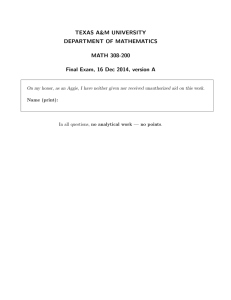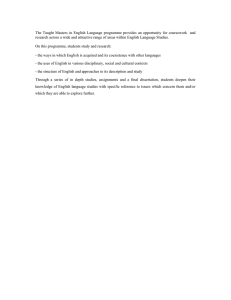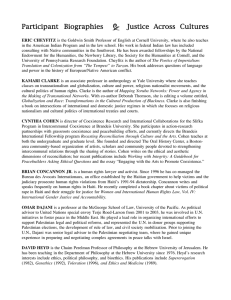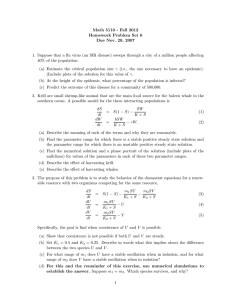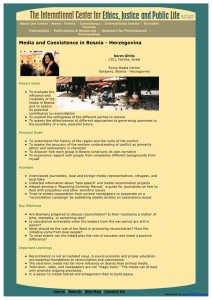PAX 186a: Introduction to Intercommunal Coexistence Spring 2003 Syllabus and Calendar
advertisement
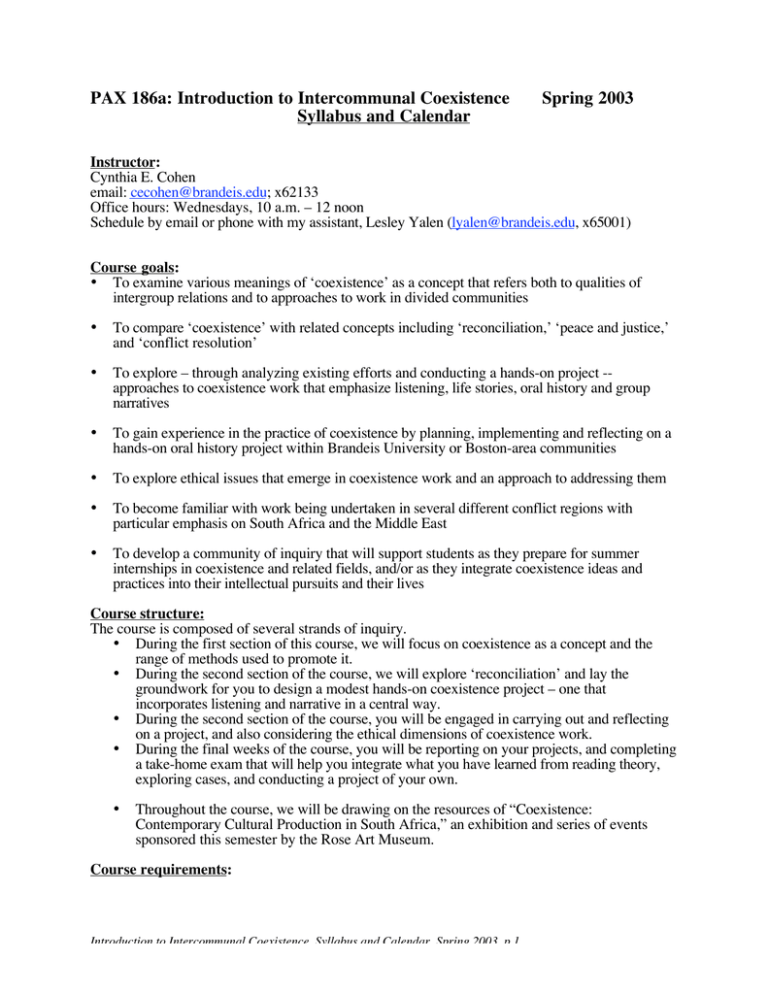
PAX 186a: Introduction to Intercommunal Coexistence Syllabus and Calendar Spring 2003 Instructor: Cynthia E. Cohen email: cecohen@brandeis.edu; x62133 Office hours: Wednesdays, 10 a.m. – 12 noon Schedule by email or phone with my assistant, Lesley Yalen (lyalen@brandeis.edu, x65001) Course goals: • To examine various meanings of ‘coexistence’ as a concept that refers both to qualities of intergroup relations and to approaches to work in divided communities • To compare ‘coexistence’ with related concepts including ‘reconciliation,’ ‘peace and justice,’ and ‘conflict resolution’ • To explore – through analyzing existing efforts and conducting a hands-on project -approaches to coexistence work that emphasize listening, life stories, oral history and group narratives • To gain experience in the practice of coexistence by planning, implementing and reflecting on a hands-on oral history project within Brandeis University or Boston-area communities • To explore ethical issues that emerge in coexistence work and an approach to addressing them • To become familiar with work being undertaken in several different conflict regions with particular emphasis on South Africa and the Middle East • To develop a community of inquiry that will support students as they prepare for summer internships in coexistence and related fields, and/or as they integrate coexistence ideas and practices into their intellectual pursuits and their lives Course structure: The course is composed of several strands of inquiry. • During the first section of this course, we will focus on coexistence as a concept and the range of methods used to promote it. • During the second section of the course, we will explore ‘reconciliation’ and lay the groundwork for you to design a modest hands-on coexistence project – one that incorporates listening and narrative in a central way. • During the second section of the course, you will be engaged in carrying out and reflecting on a project, and also considering the ethical dimensions of coexistence work. • During the final weeks of the course, you will be reporting on your projects, and completing a take-home exam that will help you integrate what you have learned from reading theory, exploring cases, and conducting a project of your own. • Throughout the course, we will be drawing on the resources of “Coexistence: Contemporary Cultural Production in South Africa,” an exhibition and series of events sponsored this semester by the Rose Art Museum. Course requirements: Introduction to Intercommunal Coexistence, Syllabus and Calendar, Spring 2003 p.1 • Thoughtfully completing frequent brief assignments; promptly and thoughtfully attending and participating in class attendance; consistently completing readings, as demonstrated in discussion and assignments. (20% of grade) • Designing and creating posters that 1) express your considered understanding of the concept of ‘coexistence,’ and 2) will generate interest in coexistence within the Brandeis community and stimulate dialogue across boundaries; and reflecting on that process (10% of grade) • Planning, implementing and reflecting upon an oral history/coexistence intervention in the Brandeis community (35%). The intervention can be done individually or in teams. Reflection papers should be completed by each student independently, although you may solicit opinions from your classmates and credit them for their thinking. • Final take-home examination. (35%) Note: If you are a student with a documented disability on record at Brandeis University and wish to have a reasonable accommodation made for you, please see the instructor immediately after class. REQUIRED TEXTS: Abu-Nimer, Mohammed, editor. Reconciliation, Justice and Coexistence: Theory and Practice. Lanham, Boulder, New York and Oxford: Lexington Books. 2001. (Will be available in the bookstore.) Agbaria, F. and Cohen, C. Working with Groups in Conflict: the Effects of Power on the Dynamics of the Group. Waltham, MA. The International Center for Ethics, Justice and Public Life. 2001 Cohen, C. Working with Integrity: A Guidebook for Peacebuilders Asking Ethical Questions. Waltham MA: International Center for Ethics, Justice and Public Life. 2001. (distributed in class) Fitzpatrick, Marie-Louise. The Long March. Berkeley: Tricycle Press. 1998 (available in bookstore) van Tongeren, Paul: People Building Peace: 35 Inspiring Stories from Around the World. European Centre for Conflict Prevention, May, 1999. Available on-line at: http://www.euconflict.org/dev/ECCP/ECCPSurveys_v0_10.nsf/webmainframe_peacebuilding?open frameset [Note: click on “Go To People Building Peace”; then click on “Table of Contents”; then click on the title of the article you wish to read] Several videos will also be assigned. Introduction to Intercommunal Coexistence, Syllabus and Calendar, Spring 2003 p.2 PAX 186a: Introduction to Intercommunal Coexistence Spring 2003 Part I: Conceptions of Coexistence and Preparation for Coexistence Work SESSION 1: Tuesday, January 14 • • Overview of course, discussion of intention and goals Oral history activity and discussion Do Assignment 1 for Tuesday, Jan. 21 SESSION 2: Tuesday, January 21 • • • • Comparison of conceptions of coexistence by Weiner, Abu-Nimer, and Kriesberg Presentation of Assefa/Cohen continuum models Discussion of subjectivity Preparation for interview assignment Do Assignment 2 for Tuesday, January 28 Do Assignment 3 for Tuesday, February 4 SESSION 3: Tuesday, January 28 • • Tour of ‘Coexistence: Contemporary Cultural Production in South Africa’ at The Rose Art Museum, led by Dr. Pamela Allara [Note: Meet at The Rose Art Museum promptly at 4:40] Begin oral history exchange on subjectivities. SESSION 4: Tuesday, February 4 • • • Discussion of exhibition and talk: What conception of coexistence informed the exhibition? What did you learn about South Africa? What did you learn about role of cultural production in furthering coexistence there? Discussion of interviews: subjectivities and listening Models of oral history/coexistence projects Do Assignment 4 for Tuesday, February 11 ______________________________________________________________________________ Part II: Conceptions of Reconciliation and Exploration of Narrative Approaches to Coexistence and Reconciliation Work SESSION 5: Tuesday, February 11 • • Discussion of reconciliation Models of oral history/reconciliation projects Introduction to Intercommunal Coexistence, Syllabus and Calendar, Spring 2003 p.3 Do Assignment 5 for Tuesday, February 18 SESSION 6: Tuesday, February 18 • • Dr. Hizkias Assefa: practitioners’ presentation on recent reconciliation efforts (tentative) Review drafts of proposals for oral history projects Do Assignment 6 for Tuesday, February 25 SESSION 7: Tuesday, February 25 • • Interview with Robin Rhode, South African artist-in-residence Discuss Minow, Bar-On and Cobb approaches to narrative in coexistence/reconciliation work Do Assignment 7 for Tuesday, March 11 MARCH 4: WINTER BREAK NO CLASS __________________________________________________________________ Introduction to Intercommunal Coexistence, Syllabus and Calendar, Spring 2003 p.4 Part III: Ethical Dimensions of Coexistence Work SESSION 8: Tuesday, March 11 • • • Up-date on oral history projects Ethical Inquiry for Coexistence and Reconciliation Workers Ethical questions in oral history/coexistence work. Do Assignment 8 for Tuesday, March SESSION 9: Tuesday, March 18 • • • Update on oral history projects Power asymmetry in coexistence and reconciliation work Should Oppressed People Empathize with their Oppressors? Do Assignment 9 for Tuesday, March 25 SESSION 10: Tuesday, March 25 • • Update on oral history projects When Should We Refrain From Speaking? Do Assignment 10 for Tuesday, April 1 Introduction to Intercommunal Coexistence, Syllabus and Calendar, Spring 2003 p.5 Part IV: Sharing, Synthesizing and Integrating Learning SESSION 11: Tuesday, April 1 Coexistence workshop with South African artist-in-residence Stompie Selibi – 4:30 – 7:30 Do Assignment 11 for Tuesday, April 8 SESSION 12: Tuesday, April 8 • • • Update on oral history projects Concluding discussions from Working with Integrity Presentation and discussion of ‘Coexistence’ posters Do Assignment 12 for WEDNESDAY, APRIL 16 TUESDAY, APRIL 15 – BRANDEIS THURSDAY, NO CLASS TUESDAY, APRIL 22 – SPRING BREAK, NO CLASS SESSION 13: Tuesday, April 29 • • • Presentation and discussion of oral history projects Wrap-up discussions. Preparation for take-home examination. Do Assignment 13, Take-home examination. Tentative due date: Monday, May 5. Introduction to Intercommunal Coexistence, Syllabus and Calendar, Spring 2003 p.6
